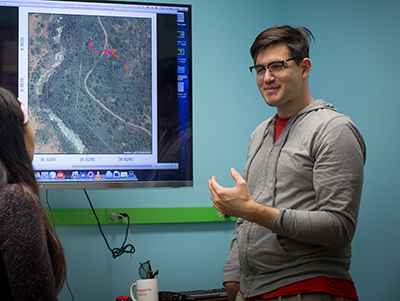Ivan

Data Mining & Research
I am a computer science Ph.D. student at the University of Illinois at Chicago, in the computational population biology lab. In my research, I develop data mining and machine learning methods for prediction in networks. I focus on interdisciplinary computational sciences, including ecology, biology, and atmospheric science. Science has always been a passion of mine; interdisciplinary research has allowed me to gain familiarity with several areas of science from a computational perspective, and I have produced work that would not be possible without close collaboration.
As a person living with cerebral palsy, I am active in advocacy and inclusion within computer science for women and other underrepresented groups. I am a 2014 Google Lime Scholar, and I volunteer with the Broadening Participation in Data Mining workshop. In my youth, I lacked the peer support I’ve now gained through these activities. At that time, I had lowered expectations for my career path and discomfort in my own body. I want to ensure that young students have the support and encouragement to succeed in research.
In a crowded professional field, I see my disability as a slight but valuable distinction and an opportunity to be a positive representation to colleagues who may not know others with cerebral palsy. By making connections and proactively sharing research ideas, I have gained research-oriented internships at Technicolor Research, Lawrence Livermore National Laboratory, and Microsoft. Furthermore, I have gained a strong intellectual connection to data mining and machine learning. I aim to contribute to these areas throughout my career.
I feel that interdisciplinary computational science dramatically extends the capability of scientific investigation. Combining deep scientific knowledge with statistics and computational methods allows scientists to develop novel hypotheses on data too large and complex to directly visualize and understand. In my research, I develop computational methods that extract repeatable and significant patterns in complex data, while scientists investigate why these patterns emerge.
I wish to see more top minds in data mining and machine learning dedicated to creating novel scientific and algorithmic understanding. Many of the grand open questions in science are now data-driven questions: how does consciousness emerge from biological structure? Does life exist elsewhere in the universe? Aside from these grand visions, new and more sophisticated data are opening up several scientific disciplines to new opportunities for interdisciplinary research. I am tremendously excited to enter such a vibrant and expanding landscape of data-driven science. I have big ideas about how data-driven science can change the world.